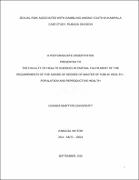| dc.description.abstract | The status of sexual and reproductive health (SRH) of youth and adolescents in urban areas across the globe especially in developing countries like Uganda is alarming. Evidence from Uganda Aids Indicator survey 2011, indicates that over 31% youth who have never married are engaged in sexual intercourse and very many of these have never tested for HIV. Gambling is clearly on the increase in major towns and cities drawing in several youth. However, the risk this practice poses on the youth sexual behavior and its resultants risks have not been investigated in Uganda. This study intended to fill this gap. This study examined the sexual risk associated with gambling among youth.
The study employed a quantitative cross sectional study design and was conducted in Rubaga division in Kampala city on 397 youth aged 15-24 years comprising of youth who currently gamble and those who do not gamble. It employed a systematic sampling scheme in selecting households with youth that responded to the household survey questionnaire.
Results showed that more males than females are engaged in gambling, majority of youth start gambling at while they are still below 18 years and are majorly pulled by competition with peers and desire to earn money. Compared to non-gambling youth, gambling youth have more sexual encounters, initiate sexual activity at a young age, have unprotected sex, have sex with more than one partner whom they do not know their HIV status and have sex under influence of alcohol. On the other hand, gambling youth highly utilize SRHR services like HCT, STI screening and management, cervical cancer screening and management, modern methods of family planning, antenatal care and SRHR counseling compared to non-gambling youth.
The study recommends that the government should form and strongly enforce policies on gambling activities to minimize the involvement of children in this activity and through the ministry of health and civil society organizations create programs to reach these youth with SRHR services. | en_US |


